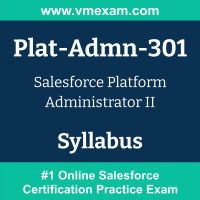 The Salesforce Plat-Admn-301 exam preparation guide is designed to provide candidates with necessary information about the Platform Administrator II exam. It includes exam summary, sample questions, practice test, objectives and ways to interpret the exam objectives to enable candidates to assess the types of questions-answers that may be asked during the Salesforce Certified Platform Administrator II exam.
The Salesforce Plat-Admn-301 exam preparation guide is designed to provide candidates with necessary information about the Platform Administrator II exam. It includes exam summary, sample questions, practice test, objectives and ways to interpret the exam objectives to enable candidates to assess the types of questions-answers that may be asked during the Salesforce Certified Platform Administrator II exam.
It is recommended for all the candidates to refer the Plat-Admn-301 objectives and sample questions provided in this preparation guide. The Salesforce Platform Administrator II certification is mainly targeted to the candidates who want to build their career in Administrator domain and demonstrate their expertise. We suggest you to use practice exam listed in this cert guide to get used to with exam environment and identify the knowledge areas where you need more work prior to taking the actual Salesforce Platform Administrator II exam.
Salesforce Plat-Admn-301 Exam Summary:
| Exam Name | Salesforce Platform Administrator II |
| Exam Code | Plat-Admn-301 |
| Exam Price |
Registration fee: USD 200 Retake fee: USD 100 |
| Duration | 105 minutes |
| Number of Questions | 65 |
| Passing Score | 65% |
| Recommended Training / Books |
Prepare for your Salesforce Platform Administrator II Certification Administer, Extend, and Automate Salesforce - ADX211 |
| Schedule Exam |
Kryterion Webassessor PEARSON VUE |
| Sample Questions | Salesforce Plat-Admn-301 Sample Questions |
| Recommended Practice | Salesforce Certified Platform Administrator II Practice Test |
Salesforce Platform Administrator II Syllabus:
| Section | Objectives | Weight |
|---|---|---|
| Security and Access |
- Given a scenario, determine the implications to record and field data access (Sharing model, controlled by parent, grant access by hierarchies, dashboard and report folders access, email folder access, Territory Management). - Compare and contrast the capabilities of custom profiles, permission sets, and delegated administration. - Given a scenario, determine the implications of user authentication. - Compare and contrast the capabilities of a complex business model (Person accounts, Account, Contacts, and Contact to multiple Accounts). |
20% |
| Objects and Applications |
- Given a scenario, determine the appropriate solution to enhance or extend objects (master-detail, lookup, junction object, related list, record type, schema builder, and object creator). - Given a scenario, determine the appropriate solution to enhance or extend the UI/UX with applications (app manager, lightning app builder, dynamic forms, standard lightning page components, console, and lightning page analyze button). |
19% |
| Auditing and Monitoring |
- Given a scenario, determine the appropriate tools for monitoring and troubleshooting system activity (debug log, set up audit trail). - Explain how to ensure sensitive data is set up to support a business/legal/compliance use case in production and sandbox environments. - Explain how to review and troubleshoot security settings including pending updates that may change system access. |
10% |
| Cloud Applications |
- Describe the features of Salesforce which enable Sales users to conduct the sale process, including products, price books, schedules, orders, and quotes. - Distinguish and understand the implications and capabilities of Forecasting and Territory Management. - Explain how to create and maintain Salesforce Knowledge (article record types, data categories). - Explain how to create and maintain service entitlements and entitlement processes. - Describe the features of Salesforce which enable interaction between support agents and customers (Chat, Case Feed, Service Cloud Console, Experience Cloud sites, Omni-Channel). - Given a scenario, understand the standard Salesforce suite of products that enable extending the core platform. |
11% |
| Data and Analytics Management |
- Explain the tools and best practices for assessing, improving, and enriching data quality (data types, validation, managing duplicates, enriching, archiving). - Given a scenario, determine the appropriate analytic tools to meet complex reporting requirements (custom report types, reporting snapshots, complex charting, custom summary formulas, bucketing, joined reports, cross filters, dynamic dashboards, dashboard filters). - Understand methods to connect to, access, backup/restore, or archive data outside of the Salesforce platform (big objects, data warehouse, external objects, data lakes, third-party solutions, and Salesforce Connect). - Given a scenario, identify the appropriate tools and methods for importing data into Salesforce (data import wizard, data loader, and external ID). |
13% |
| Environment Management and Deployment |
- Describe the options available to move metadata between environments (change sets, sandboxes, and AppExchange - managed/unmanaged). - Describe the capabilities and best practices for using change sets to move metadata between environments. |
7% |
| Process Automation |
- Given a complex scenario, determine the solution using the best tool or combination of tools to solve a business problem. - Given a scenario, identify the appropriate tool or method for troubleshooting declarative automation. - Given a scenario, explain the capabilities and limitations of each declarative automation tool. - Understand the implications of the order of execution when using automation tools. |
20% |
